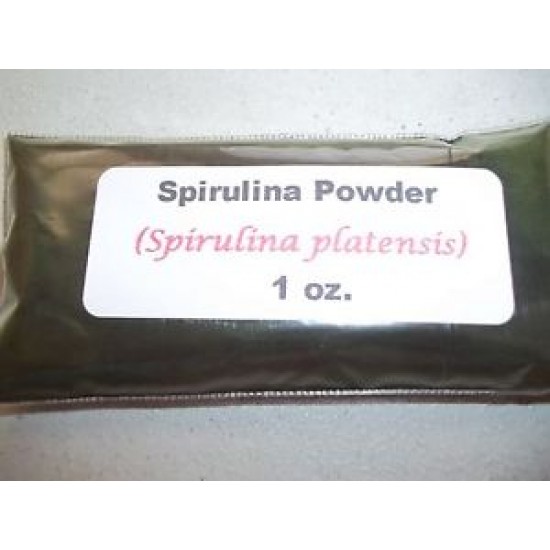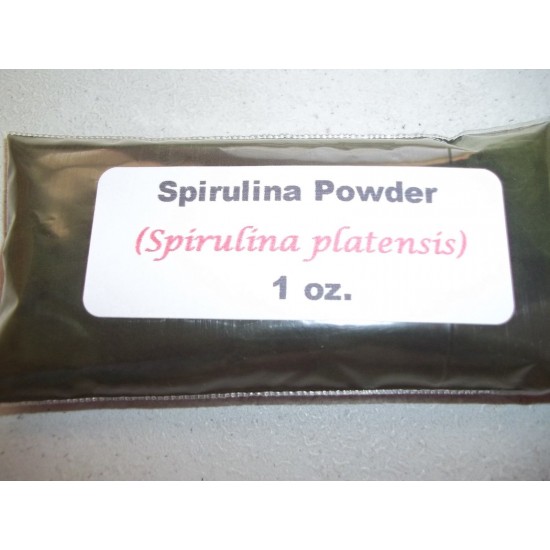Spirulina Powder (Spirulina platensis) 28g




Spirulina Powder (Spirulina platensis) 28g
$15.99
Ex Tax: $15.99
- Stock: 491
- Model: 321632349174
- SKU: 321632349174
Traditional Use and Health Benefits
Spirulina has long been used by indigenous populations around the world, especially in China, Japan and Korea. It was also a notable food source of the Aztecs, as Cortés and his Spanish Conquistadors observed during their visit to Lake Texcoco in 1519. Called Tecuitlatl by the Aztecs, meaning “the stones excrement”, it was commonly dried into cakes to be sold at markets and added to food.
Spirulina Benefits:
Often referred to as a blue-green algae, Spirulina is not a true algae in biological terms but rather a cyanobacteria. This distinctive classification is given because its genetic material is not organised in a membrane bound nucleus yet it still uses the sun as a source of energy just like plants do.
High in Plant Protein
With 70% complete protein (containing all 9 of the essential amino acids), this is a fabulous protein source for vegans – the hardy protein found in spirulina is high in net protein utilisation, meaning it is 85% - 95% digestible – with its amino acids being delivered to the body for almost instant absorption. As a comparison, pound for pound, beef has only around 20% net protein utilisation.
Proteins are the main building blocks of the body used to make muscles, tendons, organs and skin. They are also used to make enzymes, hormones, neurotransmitters and other tiny molecules that serve various functions – without protein our bodies would biochemically dismantle, life as we know it would not be possible.
Nutrient Dense
Spirulina contains almost the full spectrum of B-vitamins, these are essential to the health of the central nervous system and the brain. Ensuring a plentiful supply of these important vitamins will positively influence mood, mental acuity and cognitive prowess. High in many other essential vitamins and minerals (it contains 26x the calcium of milk), the nutrients in spirulina are highly bioavailable - this is because the cell wall is composed of mucopolysaccharides instead of indigestible cellulose which is easily broken down by the digestive system.
Powerfully Antioxidant
Uniquely, spirulina also contains the phytochemical phycocyanin, this is the pigment that gives spirulina its blue-green hue. Often referred to as the “Wonder Molecule”, studies of phycocyanin have shown it has extremely high antioxidant activity and is powerfully anti-inflammatory. It also has potential therapeutic benefits for improvement of a weakened immune function caused by the use of toxic drugs, and has been shown to increase the expression of essential enzymes and biochemicals related to the balanced function of the liver and the kidneys.
High in Chlorophyll
Chlorophyll is found in all green plants, it is the result of photosynthesis – the plant’s utilisation of light for food. It is wonderfully alkalising and due to its startling similarity to haemoglobin (a critical part of human blood), it oxygenates the blood in the same way. The only difference in the molecular structure is their central atom, which is iron for haemoglobin and magnesium for chlorophyll.
Source of Omega Fatty Acid
Spirulina is second only to human breast milk in its gamma linolenic acid content (GLA). A standard 10 gram dose of spirulina contains 131mg of GLA – this comes from the omega 6 “parent” and is metabolised differently to other omega 6’s. Omega 6 is often demonised because our modern Western diet is rife with omega 6 and deficient in omega 3, but it is the imbalance which sets in motion the inflammatory process implicated in most killer diseases of aging. GLA is powerfully anti-inflammatory and converts into beneficial prostaglandins which have a profound reduction on the impact of inflammation in cardiovascular disease, lung function, autoimmune conditions and metabolic abnormalities. In spirulina, because the omega 6 is already pre-converted to GLA, there is no competition for the enzymatic pathway leaving it open for any omega 3 you may be consuming at the same time.
Typical Use
Spirulina Powder-
1/2 to 2 teaspoons 1 or 2 times per day
500mg Spirulina Tablets-
1-4 tablets taken 2 or 3 times per day
1




-250x250h.jpg)





